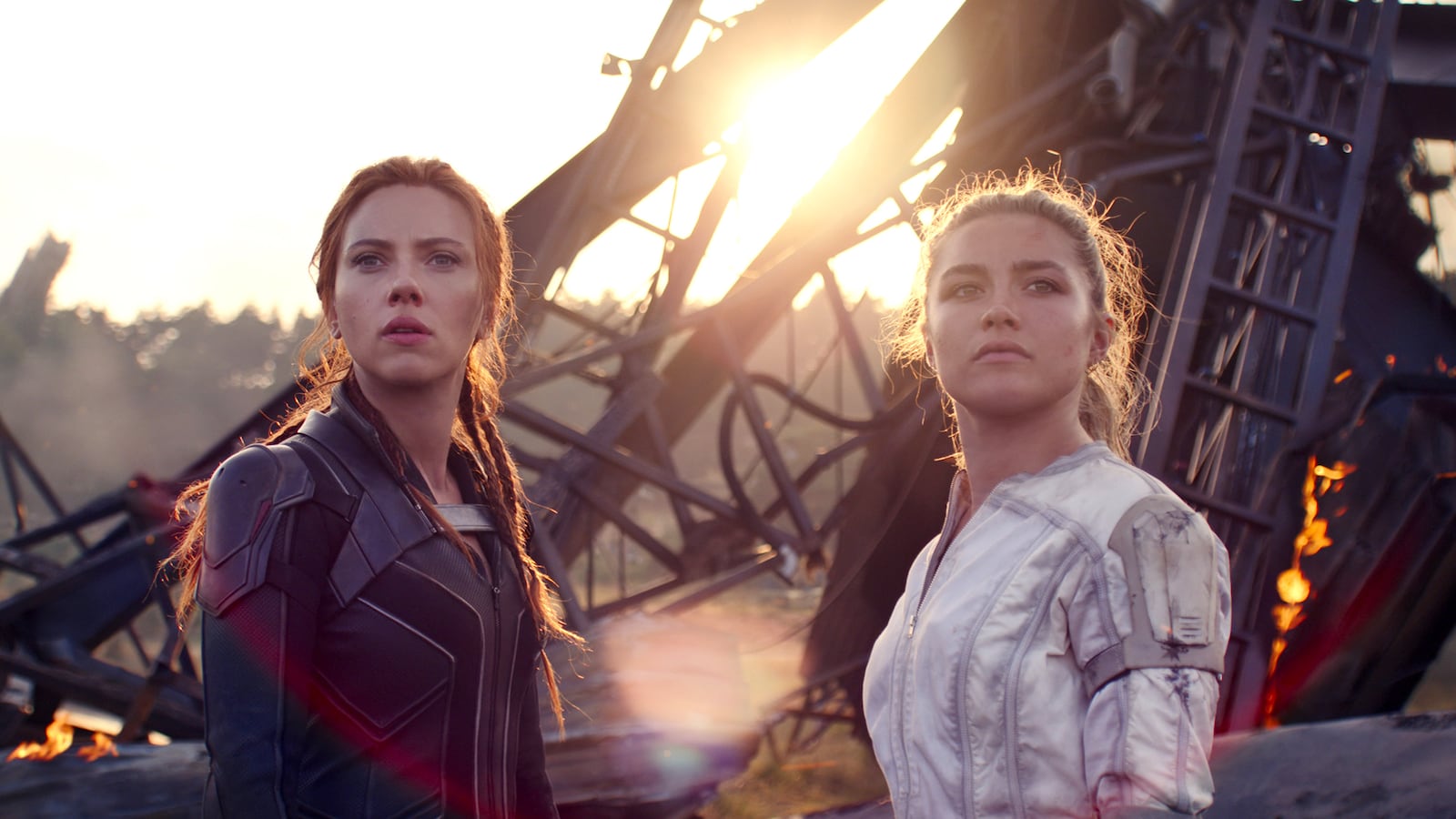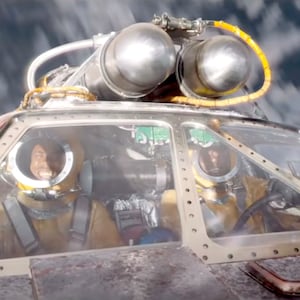This post contains spoilers for Black Widow.
For the casual viewer, Black Widow will likely prove all kinds of confusing. But it’s hard to blame anyone who’s confused as to why Marvel is just now releasing its first standalone film dedicated to Natasha Romanoff. After all, she is technically dead.
Black Widow, which joined Phase Four of Marvel’s sprawling cinematic universe Friday, takes place after the events of Captain America: Civil War and Avengers: Infinity War. (The former debuted in 2016; the latter, in 2018.) Natasha died in 2019’s Endgame after sacrificing her life to secure the Soul Stone, which the Avengers needed to defeat Thanos.
Now—meaning, in this new film, which is in the past—we find Black Widow on the run from authorities after helping Captain America free Bucky Barnes. She returns to her safe house in Budapest after receiving a mysterious package from her “sister,” Yelena (Florence Pugh), who grew up by her side in Ohio under the care of Russian operatives. Alexei (David Harbour) and Melina (Rachel Weisz) used their fake family as a cover while they worked to steal a chemical that somehow separates people from their free will. (Yeah, I don’t know about that, either.)
After a sisterly reunion-fistfight, Natasha and Yelena set out to kill the creator and ruler of the Red Room and the Widows, Dreykov (Ray Winstone)—who has abducted countless young girls across the world to do his bidding.
Marvel released 20 films before they finally debuted their first about a woman, Captain Marvel, in 2019. Throughout her career in the MCU, Natasha Romanoff has largely existed to support the story arcs of men around her, whether by helping Captain America confront his past or lending Bruce Banner a shoulder to cry on through his Hulky identity crisis. Now, after 13 years of clamoring from fans and critics, she finally has her own film—after she’s already dead in the main continuity. (In fairness, the original plan was to release Black Widow last spring—but even barring the COVID disruption, the film had always been planned to debut after Endgame.)
This would all be less frustrating if Black Widow itself weren’t so phoned in, but even a stellar performance from Florence Pugh can’t save this empty plot vehicle masquerading as a quippy espionage thriller.
Black Widow might have largely stepped away from the Avengers world to send off our favorite red-headed assassin, but even so, it’s impossible to forget that this entry, like all the others, is just one piece of a larger puzzle. Every mention of Clint Barton—and there are a few—is a reminder that the character’s TV series, Hawkeye, is coming soon on Disney+. Julia Louis-Dreyfus’ appearance in the post-credits scene as Contessa Valentina Allegra de Fontaine tethers the film to The Falcon and the Winter Soldier, where she also appears. Hell, the entire film only makes sense if you remember what happened in two others that came out three years ago.
Whatever problems Black Widow has, however, the performances are almost uniformly spectacular. Scarlett Johansson and Pugh’s chemistry crackles in every scene they share. Yelena goads her sister for being one of the Avengers but not “one of the big ones,” and loves to make fun of the hair-flipping fighting stances that have become the character’s signature. (“I mean, they’re great poses, but it does look like you think everyone’s looking at you all the time.”) David Harbour, meanwhile, was the perfect choice to play their “father,” Alexei—a Soviet supersoldier whose time in prison has left him a bit rusty.
When Black Widow moves like a spy thriller, it mostly strikes a satisfying blend of suspense and comedy, both exemplifying and satirizing the genre and its many gimmicks. (A crucial double-reveal toward the end was basically ripped from the Mission: Impossible playbook.) But the film also seems eager to highlight a deeper, darker motif about the subjugation of women, and these attempts are often more grating than illuminating.
This might be Natasha Romanoff’s movie, but Yelena’s feelings of betrayal and isolation provide the emotional scaffolding. Yelena was only 6 years old when her illusion of family fell apart; the three years she had spent with Natasha, Alexei, and Melina were the happiest in her life, she says at one point, but everyone around her was simply playing a part.
But Black Widow’s exploration of both Yelena and Natasha’s pain feels absurdly shallow given everything we know they’ve endured: They were abducted as children, brainwashed, forcibly sterilized, and trained to become child assassins. Yelena was also drugged.
As one might expect from a film about a network of indoctrinated killers, free will comes up often in Black Widow—and more often than not, one word is used to express that virtue. When Melina explains her role in Natasha and Yelena’s abuse, she says that as a Widow herself, “I was never given a choice.” During her confrontation with Dreykov, Natasha tells him, “You took my choices and tried to break me—but never again.” And when the sisters cure the Widows from their brainwashing and set them free, Natasha tells them, “You get to make your own choices now.”
Given that Black Widow begins with a three-minute montage featuring stock images of world leaders set to a slowed-down cover of “Smells Like Teen Spirit,” it would be foolish to expect much subtlety from its messaging. Still, somewhere around the line where someone uttered the words, “To him we are just things” to describe Dreykov, I found myself getting cranky.
The line feels like a direct reference to Mad Max: Fury Road, a female-led action movie that featured the viral line, “We are not things!” When Dreykov tells Natasha that young girls are “the only natural resource the world has too much of,” it’s hard not to think of Immortan Joe. Fury Road debuted in 2015, the same year that Star Wars released The Force Awakens with Daisy Ridley front and center. Both films, along with the recently released Wonder Woman, re-ignited cries for a Black Widow movie after years of sustained nagging.
Whether or not the Fury Road echo was intentional, it’s a reminder of just how long Black Widow took to arrive, and how absurd that reality is.
The late arrival could be forgiven if Black Widow actually elevated Black Widow’s story into something meaningful, but the film’s most direct reference to the trauma Natasha and Yelena endured arrives through the filter of Marvel banter. When the two bust Alexei out of prison to help them find and kill Dreykov, he scolds Yelena’s sour demeanor by asking, “Is it your time of the month?” Her response: “I don’t get my period, dipshit. I don’t have a uterus… That’s what happens when the Red Room gives you an involuntary hysterectomy. They kind of just go in, and they rip out all of your reproductive organs. They just get in there and they chop them all away, everything out, so you can’t have babies…”
Being that this is a Marvel movie and not a conference on reproductive freedom, it would be foolish to expect an in-depth discussion of the traumatic effects of forced sterilization. Still, the moment characterizes the broader issue with Black Widow, and perhaps Black Widow in general: The film invokes a gruesome abuse of civil liberties that affects real women around the world but avoids any emotional or intellectual engagement beyond that.

Everyone responds to trauma differently, but Yelena and Natasha’s closed-off demeanor feels more like a byproduct of Hollywood’s refusal to let its “strong female characters” experience the full spectrum of human emotions—and, if we’re being honest with ourselves, Marvel’s allergy to most human, non-world-saving emotions in general. (With the exception of Wanda Maximoff, who experiences more deep emotions than pretty much all of her peers combined.) Because of this, the film’s repeated insistence on vaguely, glancingly invoking the fight for reproductive freedom feels more like a cynical gesture toward meaning than a fully-developed theme.
I probably wouldn’t be so picky about this if Marvel and its corporate overlord, Disney, hadn’t made this maneuver their bread and butter for so long. But somewhere between the “exclusively gay moment” in 2017’s Beauty and the Beast and the unearned “girl power” scene in Avengers: Endgame, my patience ran out.
My frustration with Black Widow probably has less to do with the film itself than with the larger machine that contains it—with the fact that every time two men kiss in a Star Wars film we somehow wind up talking about it like it’s groundbreaking, and with the fact that Black Widow started in this franchise with Jon Favreau drooling over her and still can’t make it through even her own standalone film without at least one ass shot. And the fact that even despite this, the film will likely receive widespread praise for its “self-aware” take on the character—as though awareness of a problem is the same as solving it.
Yelena’s non-stop teasing about Black Widow’s poses feels like an acknowledgement of how this character has been treated like a decorative object in the past—but the real punchline is the futility of delivering such a joke after Natasha is already dead. And for those who forgot, a gentle reminder: Endgame heavily implied that she did so because she’d decided that as a single woman with no children, she had less to live for than Clint Barton, who has a family.
Throughout this cluttered continuity, characters like Tony Stark and Steve Rogers and Thor—the “big ones”—all went on true hero’s journeys. Black Widow only ever got to cheer from the sidelines, her potential constantly teased but never really delivered. If the powers that be at Marvel want to talk about “choices,” they would do well to consider why that is. We’ve had enough self-aware jokes to last an immortal demigod’s lifetime. Let’s just try and make sure that next time someone launches a multi-billion dollar action franchise, at least one of the “big ones” is a woman.



